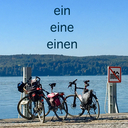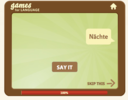German Language Game: Geben - Present Tense
Quick German Language Game: geben (to give) - present tense.
Level: Elementary (A2)
Playing Time: 4 minutes
Learn and practice the present forms of "geben" with this fun interactive online game.
Present Tense: stem vowel changes: du, er/sie/es = "i"; all others = "e" (including the formal "Sie")
"Geben" + indirect object (give "to whom"): Ich gebe dir ... (I give [to] you ...).
"Geben" + direct object (give "what"): Ich gebe das Geld. (I give the money.)
Present Tense of "geben"
ich gebe - I give
du gibst - you give
er/sie/es gibt - he/she/it gives
wir geben - we give
ihr gebt - you-all give
sie/Sie geben - they/you(form.) give
Idiomatic expressions
es gibt - there is
Was gibt's? - What's up?
Indirect Pronoun Objects - give "to whom":
mir - (to) me
dir - (to) you [familiar]
ihm - (to) him/it
ihr - (to) her
uns - (to) us
euch - (to) you-all
ihnen/Ihnen - (to) them/you (formal)
Direct Objects - give "what":
Ich gebe dir den Kaffee. - I give you the coffee. [der Kaffee, masculine]
Ich gebe dir die Adresse. - I give you the address. [die Adresse, feminine]
Ich gebe dir das Geld. - I give you the money. [das Geld, neuter]
Short Sentences: "Geben" + Ind. and Dir. Object
Wir geben ihr die Adresse. - We give her the address.
They give us the money. - Sie geben uns das Geld.
Ich gebe dir den Kaffee. - I'll give you the coffee.
Kannst du mir das Geld geben. - Can you give me the money?
Sie gibt ihnen den Kaffee. - She gives them the coffee.
Es gibt kein Geld. - There's no money.
You'll find more in our post: How to Use the German Modal Verb "Können"
If you like our games, please SHARE us with your friends.
More Than a German Language Game
And don't forget: You can practice German online for FREE with our 36-Scene German 1 Story: "Michael in Deutschland" and our 72-Scene German 2 Mystery Story Sequel: "Blüten in Berlin?".
(If you already know that "Blüten" means blossom in German - you'll learn that Blüten has still another meaning...).
Just login HERE.
If you have any language questions - don't hesitate to contact us!

German Language Game: Ist hier noch frei?
Quick German Language Game: "Ist hier noch frei?" - (Is this spot/seat/chair free?)
With this quick online German game, you can learn and practice 17 words and phrases in the context of a mini-story.
On the train from Frankfurt to Heidelberg, Michael finds a seat at the window.
As he reads his travel guide, he hears a familiar inquiry as someone is looking for a seat: "Ist dieser Platz noch frei?" (Is this seat still free?)
This is a very useful phrase to have when traveling in Germany. Especially because it is customary to share tables at a casual restaurant, beer hall, café outside, etc.
Say the words and phrases OUT LOUD, right after or along with the speaker. It's an excellent way to improve your pronunciation and internalize grammar without thinking about it.
For example: Typical German contractions.
- "zum" = zu + dem [er geht zum Gleis - he goes to the track]
- "im" = in + dem [im Zug - in the train]
- "am" = an + dem [am Fenster - at the window]
Words in German Language Game
- er geht - he goes [gehen]
- zum Gleis zwölf - to track 12
- er fragt - he asks [fragen]
- er muss nicht lange warten - he doesn't have to wait long
- bis der Zug kommt - until the train comes
- im Zug findet er - in the train he finds [finden]
- sofort - right away
- einen Platz am Fenster - [finds] a seat at the window
- gerade als - just as
- er beginnt - he begins [beginnen]
- der Reiseführer - the travel guide
- lesen - to read
- er hört - he hears [hören]
- Ist dieser Platz noch frei? - Is this seat still free?
- eine junge Frau - a young woman
- sie setzt sich - she sits down [sich setzten]
- ihm gegenüber - across from him
If you like our games, please SHARE us with your friends.
More Than a German Language Game
And don't forget: You can practice German online for FREE with our 36-Scene German 1 Story: "Michael in Deutschland" and our 72-Scene German 2 Mystery Story Sequel: "Blüten in Berlin?".
(If you already know that "Blüten" means blossom in German - you'll learn that Blüten has still another meaning...).
Just login HERE.
If you have any language questions - don't hesitate to contact us!

German Language Game: Kommst du mit?
Quick German Language Game: Kommst du mit? - Are you coming along?
With this short online German game, you learn and practice 12 words and phrases in the context of a mini-story.
Michael is in Frankfurt where he visits his aunt and uncle.
His cousin Julia invites him to go with her into town.
This mini-story is also part of our German 1 course.
(You can play the full course for FREE by registering HERE.)
Words in Mini-Story Language Game
- mitkommen - to come along
- du kommst mit - you're coming along (familiar)
- ich komme mit - I'm coming along
- Wohin? - Where to?
- müssen - to have to, must
- ich muss - I have to
- etwas kaufen - to buy something
- Was ist das? - What is that?
- bekannt - well-known
- die Einkaufsstraße - the shopping street
- unsere bekannte Einkaufsstraße - our well-known shopping street
- brauchen - to need
- du brauchst - you need (familiar)
- ich brauche - I need
- der Reiseführer - the travel guide
- ich brauche einen Reiseführer - I need a travel guide
With this mini-story you learn and practice German in small chunks.
It also helps you to see how the language is put together. (agreement, conjugations, separable prefix)
If you like our games, please SHARE us with your friends.
More Than a German Language Game
And don't forget: You can practice German online for FREE with our 36-Scene German 1 Story: "Michael in Deutschland" and our 72-Scene German 2 Mystery Story Sequel: "Blüten in Berlin?".
(If you already know that "Blüten" means blossom in German - you'll learn that Blüten has still another meaning...).
Just login HERE.
If you have any language questions - don't hesitate to contact us!

German Language Game: ein eine einen
German Quick Language Game: "ein eine einen" - When do you use which?
With this short interactive game, you'll learn and practice easy sentences using the indefinite article "a" (ein, eine, or einen) with a direct-object noun.
Remember to always say the German out loud. It'll help you remember and sharpen your pronunciation.
Words and Sentences in German Language Game
- das Handy - the cell phone
- die Zeitung - the newspaper
- der Schlüssel - they key
- der Bruder - the brother
- Hast du ein Handy? - Do you have a cell phone?
- Nein, ich habe kein Handy. - No, I don't have a cell phone.
- Haben sie einen Schlüssel? - Do they have a key?
- Nein, sie haben keinen Schlüssel. - No, they don't have a key.
- Du hast keinen Bruder? - You don't have a brother. (familiar)
- Doch, ich habe einen Bruder. - Yes I do, I have a brother.
- Haben Sie eine Zeitung? - Do you have a newspaper? (formal)
- Ja, ich habe eine. - Yes, I have one. (i.e. newspaper)
If you want to review and practice the present tense of "haben" (to have), there's a game for that.
- haben - to have
- ich habe - I have
- du hast - you have (familiar)
- er/sie/es hat - he/she/it has
- wir haben - we have
- ihr habt - you-all have
- sie/Sie haben - they/you (formal) have
Note the form of "ein" with masculine nouns (eg. der Schlüssel, der Bruder): Das ist ein Schlüssel. (That's a key.), Ich habe einen Schlüssel. (I have a key.)
You use "kein keine keinen" for the negative of "ein eine keinen". (You don't use "nicht ein" here.)
To answer "Yes I do" in response to a negative question ("You don't ...?"), you use "doch" in German.
Don't memorize any of this.
Just pay attention when listening to German or reading.
These are typical language patterns that will become automatic with time.
If you like our games, please SHARE us with your friends.
More Than a German Language Game
And don't forget: You can practice German online for FREE with our 36-Scene German 1 Story: "Michael in Deutschland" and our 72-Scene German 2 Mystery Story Sequel: "Blüten in Berlin?".
(And - if you already know that "Blüten" means blossom in German - you'll learn that Blüten has still another meaning...). Just login HERE.
And, if you have any language questions - don't hesitate to contact us!

German Language Game: Practice "ch"
German Language Game: Practice German "ch".
A short German game to help you improve your pronunciation of German "ch."
There are two ways to pronounce "ch" in German:
1) when "ch" follows a "front vowel" (i, e, ei, eu, äu, ö)
2) when "ch" follows a "back vowel" (a, o, u, au).
The difference is subtle for English speakers, but with a little practice, done OUT LOUD, the difference becomes obvious.
With our "Say It" pronunciation "game," you can focus just on these two ch-sounds.
If you like our games, please SHARE us with your friends.
More Than a German Language Game
And don't forget: You can practice German online for FREE with our 36-Scene German 1 Story: "Michael in Deutschland" and our 72-Scene German 2 Mystery Story Sequel: "Blüten in Berlin?".
(If you already know that "Blüten" means blossom in German - you'll learn that Blüten has still another meaning...).
Just login HERE.
And, if you have any language questions - don't hesitate to contact us!
